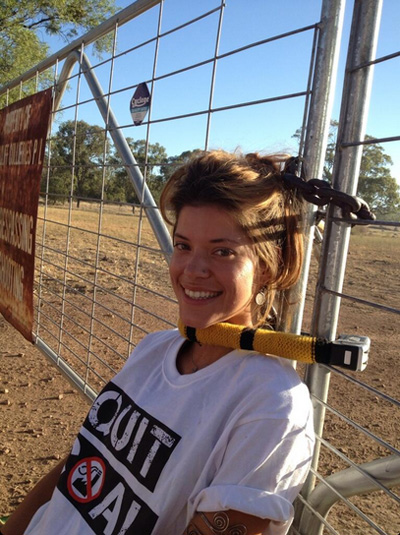A New Wave Of Direct Action Against Coal And Gas In Australia
By Dom O'Dwyer
07 May, 2014
Red Pepper
For anyone who sees themselves as more progressive than Nigel Farage, life under the new Australian government hasn't been very exciting – but over the last few weeks we have seen what could be one of the great political shifts in the country's history.
On 31 March more than 2,000 people responded to a call to ‘go back to the roots of democracy' and take direct action to protect their land, water and future from a corrupt government and a reckless company. Last year, people from the Northern Rivers region of New South Wales celebrated a win over Metgasco, when the drilling company withdrew its plans to start fracking in the area. Metgasco came back – but after declaring their region ‘CSG (Coal Seam Gas) Free', the people were ready this time. With a protectors' camp now set up and hundreds based there permanently, roads blocked with a tripod and people taking shifts chaining themselves to concrete barrels, the expected drilling machinery still hasn't shown up.
On the same day, 550km away, over 100 people took part in a day of action to disrupt the construction of Australia 's largest new coal mine in the Leard Forest . Eighty-two people were arrested, including a 92-year old Second World War veteran. Explaining his actions, Bill said, “We're faced with a catastrophe. I owe it to my grandchildren, and I owe it to all children. I was willing to put my life on the line in the Second World War, so putting my body on the line here is a small inconvenience.”

Almost every day for the past month there has been some kind of direct action. There have been women with D-locks and knitted “D-cosies” locking themselves to equipment. Groups of local farmers, spanning generations, have been using arm-tube lock-ons to demobilize massive mining trucks. The mass action last month was a peak, but not an isolated incident. The camp has been there for over a year and a half, but the numbers and effectiveness of actions has snowballed. More than 40 people were arrested in the weeks leading up to the mass action and the blockade has kept on rolling.
Australian coal exports, already the world's biggest, are set for a massive expansion. The biggest two new mines would, over their 30-year lifespan, emit an equivalent amount of CO2-e as the UK churns out in six years. The new government is on a crusade to demolish pesky regulation inhibiting the great national tradition of digging stuff up and shipping it away. But as we've already seen, the road won't necessarily be easy for the mining barons.
A super-coalition has been forming over the past four years; made up of greenies, farmers, indigenous peoples and a growing number of town and city folk who are shocked by what is happening around them. The mining industry has spread voraciously for the past decade, oozing out obese billionaires, gauging epic scars in the landscape and infecting different layers of politics as concentrated wealth so often does.
An anti-mining groundswell
Rusted-on conservative voters in country areas have had a rude awakening. Entire towns have literally had the ground torn out from underneath them. In southern Queensland over 4,000 active fracking sites seemed to pop up overnight. It wasn't until people found their health rapidly deteriorating and their water no longer safe to even bathe in that they realized they'd been lied to.
When these communities have been stonewalled by local MPs, they've found allies amongst unfamiliar faces. Indigenous people have been challenging the mining industry since the country was invaded, and environmental activists joined the fight in the 70s. It's been a pretty lonely and hard battle, and the new friendships are welcome.
The anti-mining groundswell has been building slowly for at least five years, but the growing murmurs of dissent have struggled to challenge the major parties' pro-mining consensus. The newest national government came to power with promises to ditch a mining profits tax and cut environmental regulation for the industry, while Labor extolled the ‘healthy future' of the coal industry. But the movement is getting harder to ignore now.
The coal and gas companies' cries of ‘alarmist green propaganda' and ‘vocal minorities' are becoming increasingly panicked, and their PR efforts ham-fisted. The latest swish promotional effort from the coal lobby, was quickly hijacked as the Twitter hashtag #australiansforcoal became a playground this week for satirical tweeters. Meanwhile, the latest polling shows the conservative vote dropping dramatically in rural areas and the green vote climbing to 17 per cent nationally. This could represent early signs of wider traction with the issues.
Perhaps more importantly, the energy and willingness to challenge the law and directly blockade mining projects shows no signs of easing. Another proposed fracking site 150km west of the Leard Forest coal mine is heating up with a series of lock-ons from local farmers. At the Northern Rivers camp, numbers surged to over 3,000 this Monday, with their website proclaiming ‘with numbers like this, we can't lose'. If that wasn't enough activity, the Leard Forest site is poised to see another mass intervention this week. The ongoing direct action is becoming hard to keep up with.
What we're seeing now are the fruits of years of community organizing, town hall meetings, door-to-door outreach, direct action training and a groundswell of frustration directed at a government that has taken it too far. It's hard to say whether this will mark a permanent shift in the political landscape, but all the ingredients are there.
Comments are moderated
